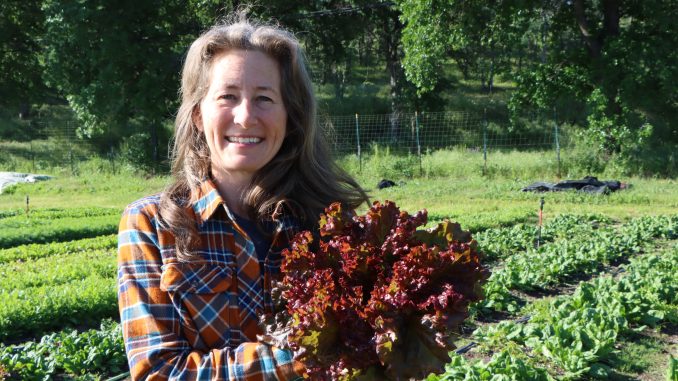
The cost-benefit analysis of composting kitchen scraps for a personal garden can be discouraging—but when the process and payoffs of recycling organic waste are scaled up to the size of a small farm, such as Red Gate Ranch in Red Bluff, coffee grounds are as good as gold.
Red Gate Ranch formed in 2012, originally focusing on livestock—goat, lamb, pig and cattle. In the early years, co-owners Heather Austin and her husband experimented with composting for their personal garden and the ranch, but struggled to ideally integrate the process into their home or business.
After years of attending conferences on organic growing and biodynamics and learning from local farmers and the late, noted organic grower Amigo Bob Cantisano, Red Gate Ranch switched the majority of their efforts from livestock to farming in 2018.
At this time, for Austin, composting went from experimental to essential.
“Compost is the base,” Austin says. “It’s the one thing we wouldn’t farm without.”
Essentially, a fast-forward for decomposition, composting is the breaking down of organic materials—such as plant material or food scraps—into a nutrient-dense fertilizer that farmers often refer to as “black gold.”
Now, though they still raise pig and cattle on Red Gate Ranch’s 110 acres, Austin’s role as Operations Manager focuses on the ranch’s 1.7 acre farm geared towards market gardening—vegetables and herbs for sale in Farmers’ Markets and CSAs.
“If you can keep all that food waste, compost it, and it can go back into the community, it can be turned into something beneficial for the community.”
Heather Austin, co-owner, Red Gate Ranch
Growing year-round, the farm produces crops such as tomatoes, melons, peppers, cauliflower, oregano and greens, including arugula, kale and baby Swiss chard.
Yet, regardless of the crop grown, Austin says a harvest almost always leaves the farm with rows of plants that need to be removed to make way for the next crop.
“A broccoli plant is a huge plant,” Austin says. “They’re these giant plants and you get one head of broccoli, normally, and then you have the entire plant mass. Where does that go?”
With a 60-foot row capable of housing close to 120 broccoli plants, the farm’s spent plants amount to quite a bit of organic byproduct created to bring the produce to market.
Handled as waste, farmers could pay to have the plant mass hauled away or simply burn it, but Austin treats it almost as a second crop. Not one that will reach market directly—but indirectly—in future seasons.
“It makes sense to use the water where it falls,” Austin says, “and I have all this plant material—let’s make use of it in our surroundings.”
After harvest, Austin’s team gathers up the plant biomass, adds water and straw, and churns it over time. Working with a soil scientist, the decomposition is monitored and adjusted, dialing in on the soon-to-be fertilizer’s ideal micronutrient combination.
“Why do we take these things that can be assets and turn them into liabilities?” Austin asks. “Let’s take this matter and turn it into miracle dust that makes everything grow.”
This year, Austin says she’ll buy hardly any compost from outside sources, cutting the farm’s expenses. However, the real benefits of composting are more rooted in the soil.
Adding organic material to the soil adds vital nutrients and creates a better soil texture for growing roots. And, when used as a mulch, compost also suppresses weeds and acts as a barrier against evaporation.
The result is better soil fertility with increased moisture retention for more resilient plants feeding off just the right micronutrients.
These days, Austin says she still adds some of her personal kitchen scraps—and the heaping piles of coffee grounds farmers create—to the farm’s compost pile. Though it’s a small portion compared to the biomass created by the farm, every bit of “black gold” is valuable.
Similarly, one household may produce a small bit of organic waste, but when added to all the households in the county, the community is sitting on a gold mine.
“If you can keep all that food waste, compost it, and it can go back into the community,” Austin says, “it can be turned into something beneficial for the community.”
By gathering a county’s food waste, diverting it from landfills, and composting it into fertilizer, a community can recycle organic waste to support local farms and help feed themselves and their neighbors.
Not bad for some used coffee grounds.

For more information on SB 1383 and how it will affect Tehama County residents, visit www.tehamacountylandfill.com. This article was funded by a grant from CalRecycle.

